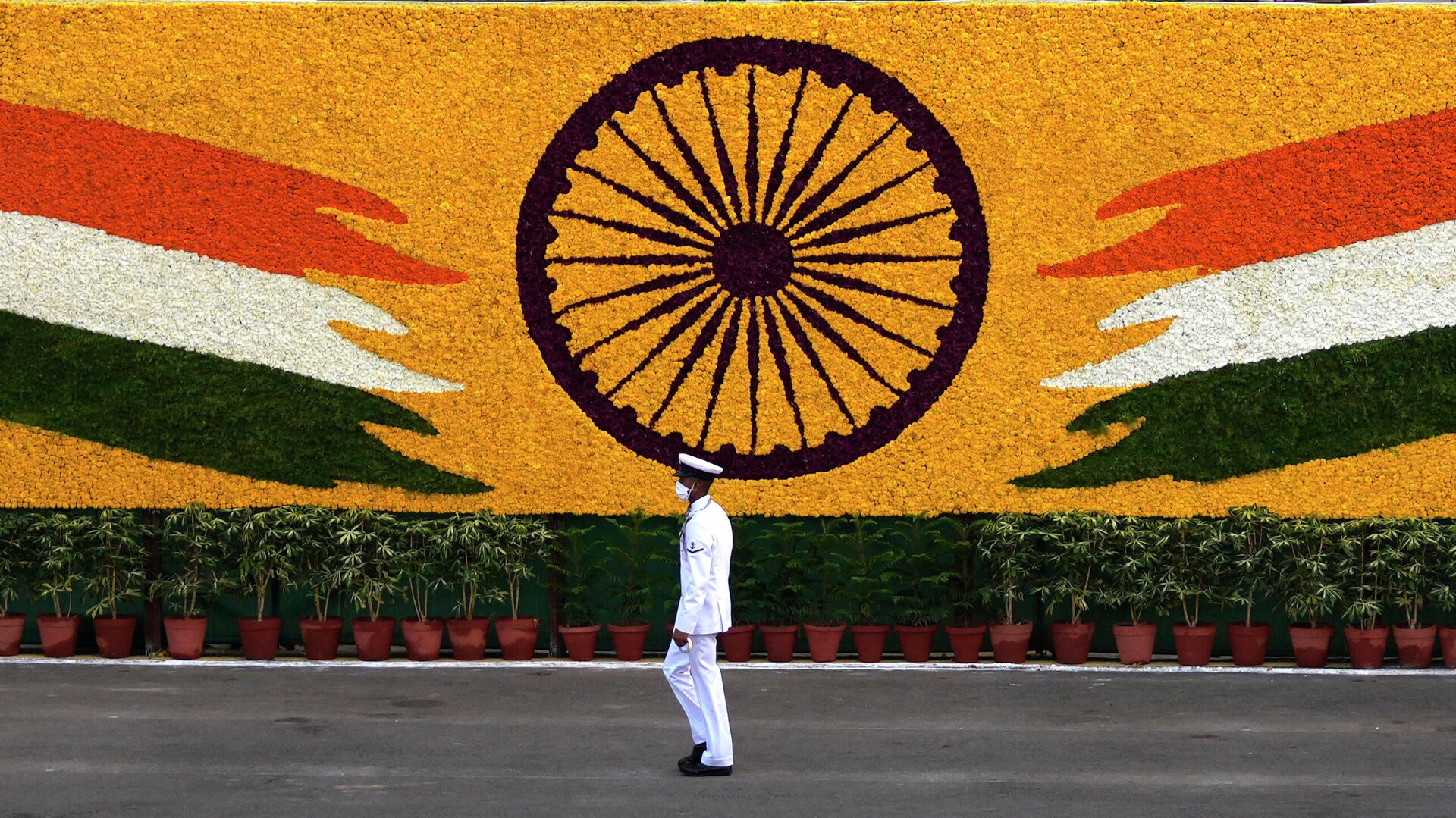https://sputnikglobe.com/20211209/india-among-countries-with-repressed-democratic-values-says-ngo-report-1091378506.html
India Among Countries With 'Repressed' Democratic Values, Says NGO Report
India Among Countries With 'Repressed' Democratic Values, Says NGO Report
Sputnik International
Prime Minister Narendra Modi's government has been blasted by opposition parties who claim that the authorities are resorting to "undemocratic" ways to curb... 09.12.2021, Sputnik International
2021-12-09T12:29+0000
2021-12-09T12:29+0000
2022-12-10T11:42+0000
democracy
narendra modi
politics
narendra modi
democracy
democracy
https://cdn1.img.sputnikglobe.com/img/07e5/0c/09/1091384937_0:0:2571:1446_1920x0_80_0_0_9ad8758b587120583d307c1796fe446d.jpg
A report by South African non-profit organisation Civicus includes India in a list of nations with “repressed” democratic values.The report was released ahead of the US-organised Summit for Democracy scheduled to start on 9 December.The report titled "People Power Under Attack 2021" shows that 37 out of 110 participants of the summit, including India, routinely restrict civic rights.The countries are divided into five categories – open, narrowed, obstructed, repressed, or closed.In reference to India, the report says: “National security and anti-terror laws such as the repressive Unlawful Activities (Prevention) Act (UAPA) have been systematically abused by Prime Minister Narendra Modi-led government to keep several people in pre-trial detention on baseless charges and deny them bail.”The Civicus report cites detentions carried out under the Unlawful Activities (Prevention) Act in the Bhima Koregaon case including those of activists Sudha Bharadwaj and Stan Swamy. The case dates back to January 2018, when violence between Dalit and Maratha groups flared up in the Bhima Koregaon area of the Indian state of Maharashtra during the celebration of the 200th anniversary of the Battle of Bhima Koregaon – a 28-year-old died while five suffered injuries.The police accused Bharadwaj, Swamy, and others of conspiring to murder Prime Minister Narendra Modi and of giving speeches, sending emails, and distributing pamphlets which eventually prompted violence against Dalits in Bhima Koregaon. While Bharadwaj was granted bail by the Bombay High Court amid the National Investigation Agency’s efforts to oppose it, Swamy died in prison after being denied bail repeatedly.The report also mentions the farmer protests against the trio of contentious farm laws that took place on Delhi's border for more than a year. The report said that India “vilified and repressed the farmers’ protest movement."“Before the reversal, the authorities blocked roads to disrupt protests, arbitrarily detaining hundreds and using excessive force,” the report states.However, the farm laws were repealed on 29 November and the farmers ended the protest on Thursday 9 December after receiving a formal letter from the Narendra Modi government agreeing to their demands.Apart from Bhima Koregaon and the farmers’ protest, curbs and other restrictions in the Jammu and Kashmir union territory are also mentioned in the report.“Raids were conducted on the homes of HRDs (human rights defenders) and offices of CSOs (Civil Society Organisations) and newspapers,” the South African NGO report says.In October, India's National Investigation Agency conducted searches at 10 locations in Jammu and Kashmir, including the office of the Greater Kashmir newspaper and activist Khurram Parvez’s home, as a part of its investigation into a terror-funding case.Meanwhile, the report mentions that critics of the Indian government and those who have spoken out in 13 other countries have been silenced by the authorities using “extra-legal tactics."In its conclusion, the report makes a slew of recommendations for countries to curb practices that affect democratic freedom. It recommends following the international human rights law and standards and creating an “enabling environment for human rights defenders, journalists and activists” while carrying out an impartial investigation into human rights violations.
Sputnik International
feedback@sputniknews.com
+74956456601
MIA „Rossiya Segodnya“
2021
Rahul Trivedi
https://cdn1.img.sputnikglobe.com/img/07e5/05/12/1082926121_0:-1:627:627_100x100_80_0_0_d882e1a63f627c25b7a534fb8b8234d7.jpg
Rahul Trivedi
https://cdn1.img.sputnikglobe.com/img/07e5/05/12/1082926121_0:-1:627:627_100x100_80_0_0_d882e1a63f627c25b7a534fb8b8234d7.jpg
News
en_EN
Sputnik International
feedback@sputniknews.com
+74956456601
MIA „Rossiya Segodnya“
Sputnik International
feedback@sputniknews.com
+74956456601
MIA „Rossiya Segodnya“
Rahul Trivedi
https://cdn1.img.sputnikglobe.com/img/07e5/05/12/1082926121_0:-1:627:627_100x100_80_0_0_d882e1a63f627c25b7a534fb8b8234d7.jpg
democracy, narendra modi, politics, narendra modi, democracy, democracy
democracy, narendra modi, politics, narendra modi, democracy, democracy
India Among Countries With 'Repressed' Democratic Values, Says NGO Report
12:29 GMT 09.12.2021 (Updated: 11:42 GMT 10.12.2022) Prime Minister Narendra Modi's government has been blasted by opposition parties who claim that the authorities are resorting to "undemocratic" ways to curb dissent in the country.
A report by South African non-profit organisation Civicus includes India in a list of nations with “repressed” democratic values.
The report was released ahead of the US-organised Summit for Democracy scheduled to start on 9 December.
The report titled "
People Power Under Attack 2021" shows that 37 out of 110 participants of the summit, including India, routinely restrict civic rights.
The countries are divided into five categories – open, narrowed, obstructed, repressed, or closed.
In reference to India, the report says: “National security and anti-terror laws such as the repressive Unlawful Activities (Prevention) Act (UAPA) have been systematically abused by Prime Minister Narendra Modi-led government to keep several people in pre-trial detention on baseless charges and deny them bail.”
The Civicus report cites detentions carried out under the Unlawful Activities (Prevention) Act in the
Bhima Koregaon case including those of activists Sudha Bharadwaj and Stan Swamy.
The case dates back to January 2018, when violence between Dalit and Maratha groups flared up in the Bhima Koregaon area of the Indian state of Maharashtra during the celebration of the 200th anniversary of the Battle of Bhima Koregaon – a 28-year-old died while five suffered injuries.
The police accused Bharadwaj, Swamy, and others of conspiring to murder Prime Minister Narendra Modi and of giving speeches, sending emails, and distributing pamphlets which eventually prompted violence against Dalits in Bhima Koregaon. While Bharadwaj was granted bail by the Bombay High Court amid the National Investigation Agency’s efforts to oppose it, Swamy died in prison after being denied bail repeatedly.
The report also mentions the farmer protests against the trio of contentious farm laws that took place on Delhi's border for more than a year. The report said that India “vilified and repressed the farmers’ protest movement."
“Before the reversal, the authorities blocked roads to disrupt protests, arbitrarily detaining hundreds and using excessive force,” the report states.
However, the
farm laws were repealed on 29 November and the farmers ended the protest on Thursday 9 December after receiving a formal letter from the Narendra Modi government agreeing to their demands.
Apart from Bhima Koregaon and the farmers’ protest, curbs and other restrictions in the Jammu and Kashmir union territory are also mentioned in the report.
“Raids were conducted on the homes of HRDs (human rights defenders) and offices of CSOs (Civil Society Organisations) and newspapers,” the South African NGO report says.
In October,
India's National Investigation Agency conducted searches at 10 locations in Jammu and Kashmir, including the office of the Greater Kashmir newspaper and activist Khurram Parvez’s home, as a part of its investigation into a terror-funding case.
Meanwhile, the report mentions that critics of the Indian government and those who have spoken out in 13 other countries have been silenced by the authorities using “extra-legal tactics."
In its conclusion, the report makes a slew of recommendations for countries to curb practices that affect democratic freedom.
It recommends following the international human rights law and standards and creating an “enabling environment for human rights defenders, journalists and activists” while carrying out an impartial investigation into human rights violations.


